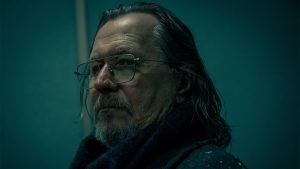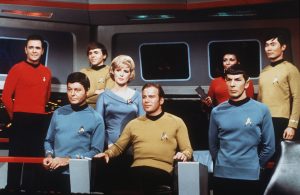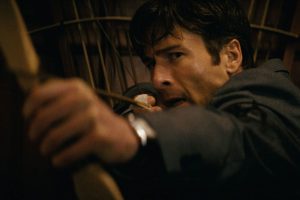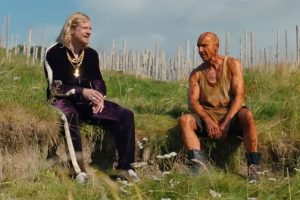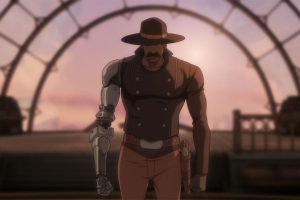
This article contains spoilers for The Sopranos.
The two-part HBO documentary Wise Guy: David Chase and The Sopranos contains a multitude of revelations about the classic mob drama and the visionary who created it. Chief among those revelations is that David Chase is secretly a certified yapper.
Over the years, the man who created The Sopranos has developed a reputation for being withdrawn, reserved, and hesitant to talk about his life’s work. That is decidedly not the case here. Perhaps it’s the set designed to look like Dr. Jennifer Melfi’s office or director Alex Gibney’s insightful questions, but Chase straight up spills his guts in Wise Guy.
“I’m just talking my fucking head off. I can’t believe it. I’m talking too much,” Chase tells Gibney early on in the proceedings.
Thankfully Chase continues to talk his head off over the span of Wise Guy‘s two-and-a-half-hour runtime. He walks Gibney and viewers through The Sopranos experience from the show’s conception as a movie starring Anne Bancroft and Robert De Niro to its mysterious, Journey-scored cut-to-black. The entirety of the two-part doc is a must-watch for all Sopranos fans, not least of which because Chase addresses the controversial conclusion of his show.
Despite his clear determination to let The Sopranos‘ ending speak for itself, Chase has been coaxed into discussing the final scene in Holsten’s Diner several times over the years, most recently with The Hollywood Reporter in 2021. Anyone who wants to “figure out” The Sopranos ending already has all the ammunition they need to do so.
Even with that in mind though, Chase has some fascinating and novel things to say about the “Made in America” finale in this doc that, to our recollection (and thorough Google queries), he has not shared anywhere else before. Here is what David Chase has to say about TV’s most infamous final episode.
The Sopranos Was Always About Death
The first invocation of The Sopranos‘ ending actually comes relatively early in Wise Guy. That’s because David Chase shares with Gibney and viewers what he’s always believed to be the overarching theme of the show. Chase confirms that the throughline of The Sopranos is about a United States of America in decline. The doc helpfully hones in on one of the first images of Tony to hammer home this point. It’s only just now that many viewers might realize that the front page headline on the Star-Ledger newspaper Tony is holding reports that President Bill Clinton believes Medicare will go bust by the year 2000.
Chase sums it up even more succinctly than that, however, asserting that the show was about “money and death and they’re related somehow.” He then notes the significance that the story aired “on television, which is the instrument capitalism uses to sell” itself. It only stands to reason that The Sopranos sought to examine both death and money right up until the very end when Tony faces down his own mortality in that perpetually cheerful symbol of Americana: a New Jersey diner.
The Journey Connection
The use of Journey’s song “Don’t Stop Believin’” blaring over the Holsten’s jukebox in the show’s final scene has always presented a juicy target for analysis. What to make of the discordant nature of this pop song playing over what is potentially a grim moment? Chase makes clear that the decision was a simple one and all came down to one recurring line in the song.
“The movie never ends, it goes on and on and on,” Chase points out. Even though The Sopranos comes to an end in this moment (and indeed Tony’s life probably comes to an end as well), the planet itself doesn’t stop. There are infinite lives to be lived beyond the blackness before the end credits, viewers just aren’t granted the opportunity to witness them.
Our minds cannot process infinity but they can process story. To that end, Chase highlights the cyclical nature of the finale. The engine in young A.J.’s car explodes, just like the grill Tony left unattended in the pilot. A.J. also attempts to repeat sage advice that Tony gave to him in the pilot (“Focus on the good times”) but of course Tony has forgotten all about it. It all does go on and on and on and on, even if no one notices.
2001: A Space Odyssey Inspired The Finale
One of the worst kept secrets in television history is that the creator of the medium’s best-ever drama doesn’t even really care for the format. David Chase is a film man, through and through, having been inspired by the works of Roman Polanski, Federico Fellini, and Ingmar Berman. He only began a career in writing for TV because that’s just who happened to be hiring at the time. Near the end of Wise Guy, Chase offers up some interesting insight to how another titan of cinema, Stanley Kubrick, directly inspired “Made in America.”
Chase reveals that he and his directing partner Alik Sakharov had numerous discussions about the visual language of Kubrick’s 2001: A Space Odyssey. They latched onto a moment in the film’s final act where the central astronaut David Bowman (Keir Dullea) witnesses himself as an older man. In an effort to have Tony Soprano subtly “witness” himself as well, Chase and Sakharov had James Gandolfini “walk through” his own point-of-view every time he enters a scene. That is to say that the camera establishes the shot as though it’s from the lead character’s perspective, and then that lead character just wanders right through it.
“It made me think of time and, I guess, approaching death or approaching something. There’s something mystical about it,” Chase says, all but giving the game away on Tony’s fate.
A Robert Frost Poem Reveals All
Wise Guy saves the best for last when it comes to analyzing The Sopranos ending. Right before the doc cuts to black in a satisfyingly troll-y fashion, David Chase directs Gibney’s attention to a seemingly unimportant scene from the show’s early days. In season 3 episode 2 “Proshai, Livushka,” A.J. is studying Robert Frost’s poem “Stopping by Woods on a Snowy Evening” and having a hard time cracking its central themes. So Meadow does her best to help him.
“What’s covering the field?” Meadow asks him.
“Snow,” he responds.
“And what does snow represent? Death.”
“I thought black meant death.”
Based on the way that Chase lets the revelation linger, it’s clear that young A.J. Soprano isn’t the only one who believes black means death.
Both episodes of Wise Guy: David Chase and The Sopranos are available to stream on Max now.
The post HBO’s David Chase Documentary Sheds Light on The Sopranos Ending appeared first on Den of Geek.
